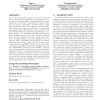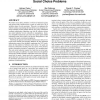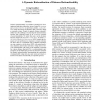33 search results - page 1 / 7 » Optimal social choice functions: A utilitarian view |
SIGECOM
2010
ACM
13 years 10 months ago
2010
ACM
One of the fundamental problems in the theory of social choice is aggregating the rankings of a set of agents (or voters) into a consensus ranking. Rank aggregation has found appl...
ATAL
2008
Springer
13 years 7 months ago
2008
Springer
Multiagent coordination algorithms provide unique insights into the challenging problem of alleviating traffic congestion. What is particularly interesting in this class of proble...
ATAL
2006
Springer
13 years 9 months ago
2006
Springer
We model social choice problems in which self interested agents with private utility functions have to agree on values for a set of variables subject to side constraints. The goal...
JAIR
2008
13 years 5 months ago
2008
In the efficient social choice problem, the goal is to assign values, subject to side constraints, to a set of variables to maximize the total utility across a population of agent...
AAAI
2012
11 years 7 months ago
2012
Distance rationalizability is an intuitive paradigm for developing and studying voting rules: given a notion of consensus and a distance function on preference profiles, a ration...



